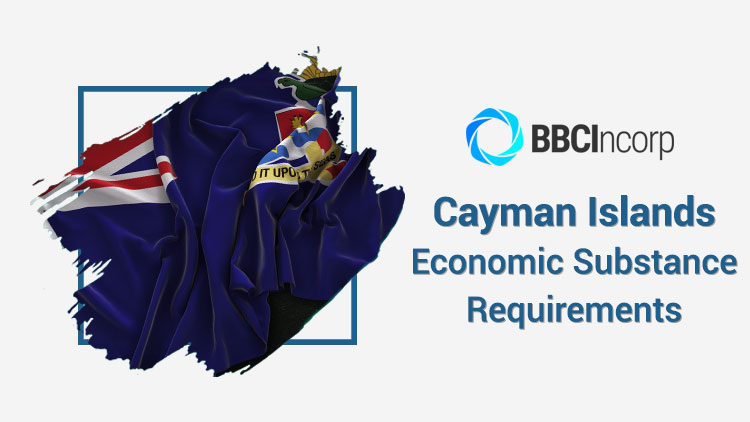
Like other offshore landscapes, Cayman Islands have also been affected by the approaches of OECD and the European Union (EU) regarding fair taxation. Cayman Economic Substance (ES) is now an essential part of any in-existence or newly incorporated entities in the Islands.
In this article, BBCIncorp gives detailed guidance on Cayman Islands Economic Substance Requirements – who is covered, how to comply with the Economic Substance law, and other related matters.
1. Introduction to Cayman Economic Substance Rules
Having drawn much attention probably was the implementation of the OECD Forum on Harmful Tax Practices, aka FHTP. The forum came with the global standard regarding substantial activity requirement to no or only nominal tax jurisdictions in November 2018.
As a member of the OECD BEPS Inclusive Framework, Cayman Islands were among the very first ones to initiate their domestic law to meet the economic substance standard.

The International Tax Co-operation (Economic Substance) Law (2020 Revision), or Cayman “ES Act”, entered into force on 1 January 2019. The Act was then amended several times to further modify the requirements of ES notification, sharing of information, and other issues.
The Cayman ES (Amendment) Law, 2020 (Law 7 of 2020) published on 12 February 2020 is currently the latest version of the ES Act.
Other supplemented regulations and guidance, namely the Guidance on ES for Geographically Mobile Activities, and Cayman ES Regulations, 2020 were thereafter issued, on 13 July 2020 and 11 August 2020 respectively.
Accordingly, ES law requires in-scope entities with geographically mobile activities in the Cayman Islands to demonstrate economic substance as an annual requirement. For each relevant activity as prescribed in the law, entities must satisfy an economic substance test, including the CIGAs test, direction, and management test, and adequacy test.
Concerning filing obligations for those entities, the two main duties are to submit ES notification to the Authority and to file an ES return to the Authority.
The Tax Information Authority (the ‘Authority’), a functional unit of the Department for Internal Tax Co-operation (DITC) in the Cayman Islands, is responsible for supervising the ES law in the Cayman Islands and guarantee compliance with the law.
In what follows, we will delve into the ins and outs of how to comply with Cayman Islands Economic Substance Requirements!
2. Entities that must comply with Cayman ES

2.1. In-scope entities under ES Law
Pursuant to Cayman ES Act, in-scope entities, or relevant entities under ES law refer to:
- A company incorporated in accordance with the Companies Law (2020 Revision), or
- A limited liability company (LLC) registered according to the Limited Liability Companies Law (2020 Revision); or
- A limited liability partnership (LLP) registered according to the Limited Liability Partnership Law, 2017; or
- A company incorporated outside of the Cayman Islands and registered in accordance with the Companies Law (2020 Revision).
2.2. Entities excluded from ES Law
There are certain out-of-scope entities, and these cases will NOT be required to observe the ES test in the Cayman Islands. Excluded cases are:
- A domestic company; or
- A company as an investment fund; or
- A company as a tax resident in an overseas jurisdiction
To be regarded as a tax resident in another jurisdiction outside Cayman, your company should provide evidence to the Authority that the company is subject to corporate tax on all of its income in another jurisdiction due to its tax residence, domicile, or other similar reasons.
And this same requirement goes for foreign branches of a relevant entity.
EXAMPLE
You own a Cayman incorporated company conducting on a relevant entity from a Hong Kong branch. Since Hong Kong branch pays corporate taxes on all of the branch’s income in Hong Kong relating to the relevant entity, the branch is regarded as a tax resident outside Cayman.
2.3. Relevant activities under ES Law
There shall be a filing obligation imposed on each relevant entity conducting on relevant activity. Like other legal jurisdictions implicating ES law, 9 relevant activities in respect of the OECD and EU standard involves:
- Banking business
- Distribution and service center business
- Financing and leasing business
- Fund management business
- Headquarters business
- Holding company business
- Insurance business
- Intellectual property business
- Shipping business
It is worth mentioning that an entity is considered to engage in a relevant activity NOT just based on relevant income from that activity. “Passive relevant income” is the income generated without participation in the business activity of the recipients.
Dividends, interest, royalties, or rental property are typical examples of this type of income. Activity with passive relevant income can be regarded as a relevant activity.
3. Cayman Economic Substance guidance: ES test and Reduced ES test

3.1. Cayman ES test
In accordance with Cayman ES Law, every relevant entity carrying on a relevant activity must satisfy the economic substance test. Note that if your company has two or more relevant activities, it is required that the ES test must be demonstrated with respect to each relevant activity.
The question is: what is included in an Economic Substance Test under Cayman ES Law?
In-scope entities conducting relevant activities will meet the ES test in Cayman if the below three conditions are met:
- Direction and management test, which means the entity is directed and managed appropriately inside the Islands in respect to its relevant activity;
- Adequacy test, meaning the entity must guarantee:
- Having an adequate level of expenses for operating the relevant activity in the Islands;
- Having an adequate number of appropriate employees in relation to the relevant activity in the Islands;
- Having an adequate place of business and specific equipment in the Islands.
- CIGAs test, meaning the entity is carrying out certain Core Income Generating Activities inside the Islands in respect to its relevant activity.
CIGAs refer to activities playing a central role to a relevant entity regarding generating relevant income. Importantly, CIGAs must be conducted in the Cayman Islands.
It should also be noted that the Cayman government does allow a relevant entity to outsource its CIGA to a third party. Still, the entity must guarantee control of CIGA in the Islands.
3.2. Reduced ES Test
Reduced ES test in the Cayman Islands is only applicable for pure equity holding companies.
Accordingly, a pure equity holding company can pass a reduced ES test if it meets the following criteria:
- The company complies with relevant filing obligations as stated in the Companies Law (2020 Revision); and
- The company has adequate employees and premises in the Islands for holding and managing equity participation in other companies.
EXAMPLE
HELO Co Ltd holds 100% of shares in the other three companies. It receives dividends on a yearly basis through this holding structure. HELO is considered to be an intermediary pure entity holding company in the Cayman Islands without engaging in any other different activity.
In this regard, HELO is a relevant entity conducting a relevant activity in the Islands. But, it would be subject to a reduced ES test instead of a much more complicated test of other relevant activities.
3.3. Other exceptions
Suppose you incorporated a relevant entity in the Cayman Islands, conducted one of nine relevant activities required to satisfy the ES test by the ES Law, but that activity generated no relevant income. In such a case, your entity would have no obligation to fulfill the requirement of an economic substance test.
Note, however, that following annual reporting duties under the Cayman ES Law is ineluctable. Your entity still must complete the ESN and ES return to the Authority, among which ES return will be filed as a “nil” one.
Further clarifications of Relevant income can be found in Section II.D of the Guidance.


.webp)



0 Comments